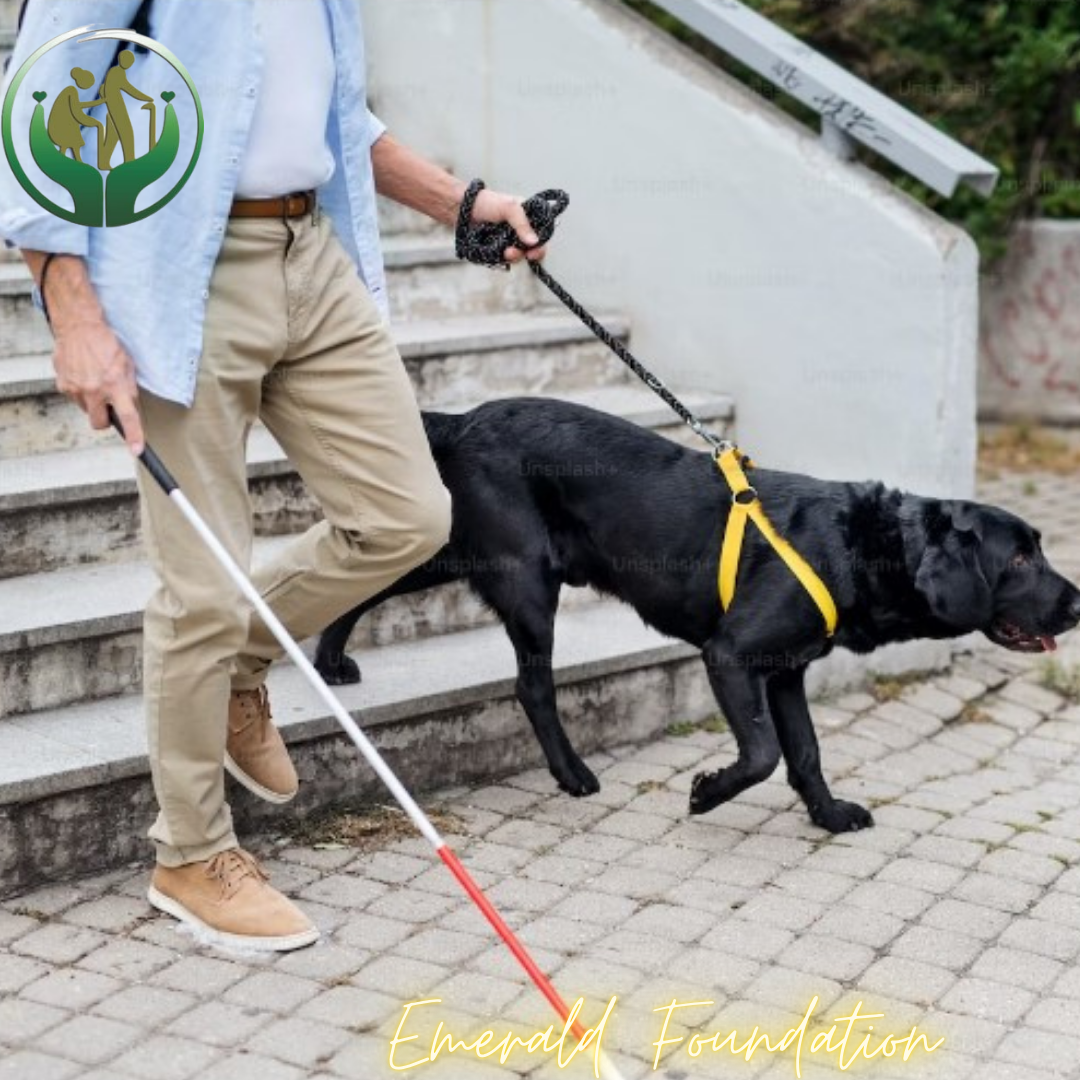8 Best Activities for Blind Seniors and How Promoting Engaging Activities for the Visually Impaired Can Benefit Senior Health
Do you or someone you love have a vision impairment? Unfortunately, it’s not just you; over half of all blind people in Nigeria are aged 65 or older.
Do you want to know what activities your visually impaired loved one can do? It may seem like there are not many activities for elderly blind persons, but there are more than you’d think.
Despite being blind, many senior citizens still enjoy their favorite activities.
It may take some adaptation and help from you, but that will make the experience more memorable and strengthen your bond.
Click here to follow us @facebook and Click here to follow us on Instagram
What Activities Can a Blind Person Do?
When you or a loved one is diagnosed with a visual impairment, it does not mean the end of activities. Instead, make sure you enjoy your chosen activities more than just see them.
People with low vision can still live active lives in various ways. For example, the following activities are fun, independent, and group activities for visually impaired elderly.
Independent Activities for the Blind Elderly
Thankfully, there are many independent activities that our loved ones can engage in, and with a bit of imagination, we can ensure that they are active and their lives are full of fun.
Some independent activities include:
- Listening to podcasts and audiobooks
- Dancing to music
- A furry companion
- Gardening
- Exercise
Group Activities for the Blind Elderly
In addition to the above-listed independent activities, there are many excellent options for group activities for the blind elderly.
A few of these include:
- Board games and cards
- Walking groups
- Exercise classes
- Coffee dates
- Cooking classes
8 Best Activities for Blind Seniors
#1: Listen to Music and Dance
Listening to music is an easy and relaxing activity for blind older adults.
All kinds of music, including your loved ones favorites, is easily accessible online through services like Apple Music or Spotify. A device like Alexa can play your favorite song, album, or artist simply by asking it.
Even though listening to music can be an enjoyable activity, it is not physically active. To take this activity to the next level, dancing can be a great addition. Dance is a fun activity that is enjoyed by all ages.
If you are setting up the dancing area, remove any obstacles that may cause people to stumble or fall.
#2: Play Trivia Games
Although physical fitness is still necessary as we age, exercising the mind is equally important. Trivia games are a fun way to keep your brain active. It can be a great way to stimulate elderly adults’ minds, and it can also be a lot of fun!
Are you working with a group of seniors? Having teams is a fun way to add a bit of competition, and winners can be rewarded with small prizes. For convenience, answers may also be called out rather than written.
Following are a few suggestions for trivia topics:
- Musicals
- Historical Events
- General Knowledge
- Television shows and movies from the past
#3: Take a Nature Walk
Feel the breeze and the sunshine outside with your vision-impaired senior. Walking in the park with a partner and taking in the sights and sounds of nature can be rejuvenating and relaxing.
Normally, you think of nature as a visual thing, but you can also feel it and hear it. Is there no park nearby? Stroll near a creek or water feature to hear the sounds of nature.
The scent of flowers and the feel of leaves on plants are sensory experiences that some seniors may enjoy.
#4: Listen to Audio Books
If your senior loves a good story or is an avid reader but is struggling because of their vision impairment, consider giving them the gift of audiobooks. Audiobooks are ideal for those who are avid readers.
You can download audiobooks from your local library or browse through dozens of apps online.
A device like Alexa makes it possible for your loved one to order books and stories with just their voice.
Would you like to add a little something special to this story time? Take hardcopy books with you when you visit your loved one. Read aloud, and this can be a positive bonding experience because the person gets to hear your voice.
#5: Attend a Musical Performance
Fans of musical concerts can still enjoy music and community by attending musical performances.
Almost anyone can be inspired or lifted by music thanks to its ability to evoke any emotion they may feel. In particular, the elderly can benefit from music’s soothing or upbeat aspects.
#6: Tell Jokes or Stories
Is there anyone who doesn’t enjoy a good joke or story? Humor helps us cope with hard times. Humor may seem like a calming balm or a light diversion, but it is much more powerful than something that simply lulls us or calms us down.
In fact, it’s one of the most overlooked weapons in our arsenal to maintain good health. During times when we are dealing with health problems (such as blindness), it’s wise to turn to a not-so-obvious way to protect ourselves.
Laughter and humor have a wide range of benefits on both mental and physical health.
Laughter has the following mental health benefits:
- Brings joy to life
- Reduces anxiety and fear
- Relieves stress
- Enhances mood
- Reduces depression
In addition to its mental health benefits, laughter also has physical health benefits:
- Improves immunity
- Reduces pain
- Stress hormones are reduced
- Increases the body’s ability to use oxygen
- Muscles are relaxed
- Heart disease prevention
- Hypertension prevention
#7: Play With Pets
Almost everyone enjoys playing with pets, and owning a pet means you always have a companion by your side. The fact that this is one of the best activities for the blind elderly should come as no surprise.
Those who are blind can enjoy petting and playing with furry animals just as much as anyone else. A dog or cat can provide a sense of responsibility, as well as help them maintain a routine. In addition to being fun, petting or playing with animals is also soothing and good for your mental health.
And if your loved one doesn’t have a pet? Almost every major city or town has a petting zoo.
In many assisted living facilities, therapy dogs regularly visit residents. Feelings of loneliness can be eased and spirits lifted by visiting therapy dogs.
3 Benefits of Offering Activities for Blind Seniors
The loss of vision does not mean seniors have to lose the enjoyment of life.
For the blind elderly, many activities fit their interests and meet their needs. However, the elderly with low or no vision can do most activities with a few simple adaptations and help from you.
Let’s look at a few benefits of offering activities for visually impaired elderly.
#1: Improves Physical Health
It can be difficult for many people with vision loss to remain physically active; however, staying active is very important for the elderly population.
Some of the benefits of physical activity for the elderly include:
- Managing pain
- Build up muscle flexibility
- Better sleep
- Cellular repair
- Decreased risk of diabetes and hypertension
If your loved one lives in an assisted living facility, he or she may also have access to on-site physical therapists and activity specialists to assist in staying active and healthy.
#2: Offers Socialization
Feelings of loneliness may cause concern when this feeling becomes chronic and pervasive.
A person’s mental state directly impacts their biological processes. For example, chronic loneliness triggers a “flight or fight” response that keeps our body on high alert.
Adverse health consequences include …
- Depression
- Poor sleep; and
- Cellular inflammation
… which results in impaired immunity and accelerated cognitive decline.
Seniors whose social needs are not met or who do not have a social circle that provides friendship and connection often have poor health. However, more social interaction and an active lifestyle can help.
Research has shown that when seniors increase the number of social activities they participate in, they feel more satisfied with life and more optimistic about their well-being.
#3: Promotes Mental Health and Wellness
Literature suggests that people with vision impairment are at greater risk for specific mental health problems. Several studies have demonstrated a link between vision impairment and depression.
If you plan activities for older adults, be sure to accommodate blind seniors. Providing appropriate activities for blind seniors and including them in activities is essential.


